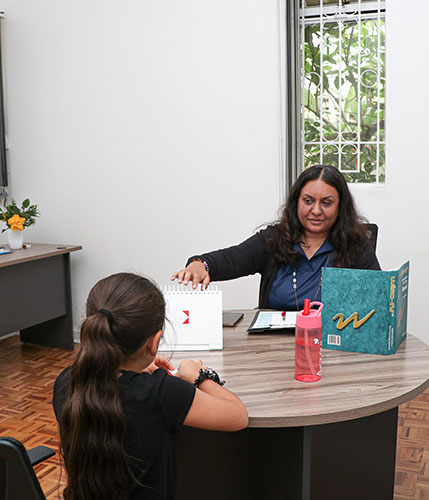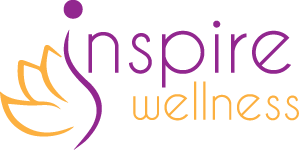Paediatric Services
Compassionate Paediatric Services for Your Little Ones - Trust Our Experts for the Best Service
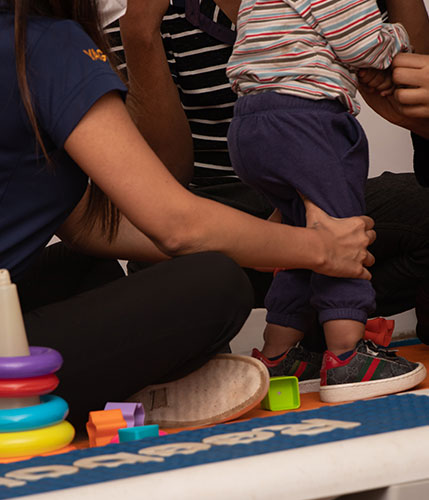
Paediatric Physiotherapy
Our paediatric physiotherapist can provide (some young people may be directed to adult services as appropriate) physiotherapy treatment for children aged between 0 and 18 years that have difficulty with their physical development as a result of neurological and/or developmental problems. They have expert skills in the assessment, identification, diagnosis of, and treatment of child development and movement difficulties.
Our aim is to work together with children, young people, their families and others involved in their care to reach their physical potential. Paediatric physiotherapists have highly developed hands-on skills, which we use with a big dash of fun, creativity, and playfulness, to develop individualized therapy programs for each of our clients. Our treatment programs are aimed to optimize the health, well-being, and abilities of each child to enable them to move and participate in everyday activities, like playing, learning, going to school, and being part of a family and community.
Some of the conditions we work with:
- Gross motor delay
- Autism Spectrum Disorder
- Cerebral Palsy
- Developmental Coordination Disorder
- Down’s Syndrome
- Acquired Brain Injury
- Muscular Dystrophy
- Torticollis/Plagiocephaly
Paediatric Occupational Therapy
Paediatric occupational therapists help children develop age-specific skills necessary for independent performance in day to day activities, also known as occupations. Broadly these skills are categorized into cognitive skills, sensory, visual, gross and fine motor skills.
Our aim is to work closely with the child, their families and teachers to reach goals that are essential for participation. Each individual has to incorporate a variety of skills in order to reach these goals and participate in daily life activities, these include: Self-care skills for example brushing, dressing and grooming, Feeding, Sleep, Play, Toilet training.
Some of the conditions we work with include:
- Autism, Sensory processing disorders
- Developmental delays
- Cerebral palsy
- Down’s syndrome
- Learning disabilities
Our team of qualified and experienced occupational therapists can also address handwriting skills, emotional regulation, social participation, balance & coordination and spatial reasoning.
Each child has different needs and limitations therefore our therapy is centered according to their difficulty areas, with play at its core. Play helps the child feel more secure as they learn to be independent in their daily activities.
Activities are designed carefully by our therapist to improve skills needed for them to achieve their goals and perform occupations independently. Our therapists can as well modify the environment to better fit the child’s needs by integrating the use of splints, mobility devices and other equipment designed specifically for the child.
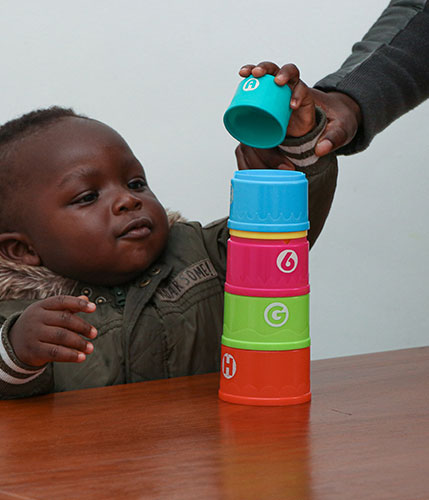
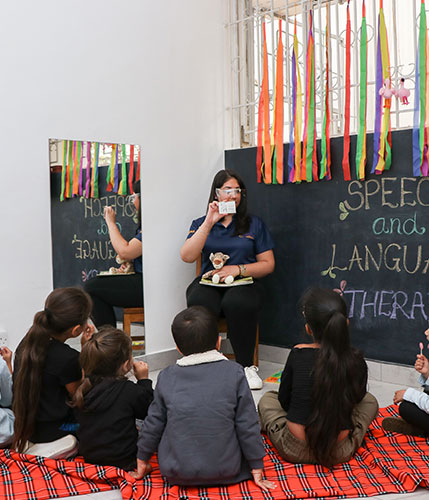
Paediatric Speech & Language Therapy
Paediatric speech and language therapy involves working with children and young adults, aged 0 – 18 years, who have a range of conditions and problems to support and develop their speech, language and communication skills. Sometimes a child’s communication difficulties can have an impact on their everyday life. Our experienced Speech and Language Therapy team can offer advice and information to families and schools on how to support children and young people in their everyday life.
Some of the conditions we work with (but not limited to):
- Autism Spectrum Disorder
- Down’s Syndrome
- Developmental Delays
- Learning Disabilities
- Articulation and Phonological Disorders
- Stuttering/Stammering
- Voice Disorders
Each child has different needs and limitations therefore our therapy is centered according to their difficulty areas, with play at its core. Play helps the child feel more secure as they learn to be independent in their daily activities.
Our aim is to enable your child to be able to communicate effectively with others to the best of their ability. By providing therapy that is significant, fun and motivating, children are more likely to willingly engage in activities and make lasting improvements.
Educational Psychology
Educational psychologists are concerned with children’s learning and development. They use their specialist skills in psychological and educational assessment techniques to help those having difficulties in learning, behaviour or social adjustment.
Many parents worry that getting a psychoeducational assessment means there is something wrong with their child. This is a myth, plain and simple. A psychoeducational assessment is a way to determine your child’s strengths and weaknesses in many different areas. Not only are these insights empowering but also act as a roadmap for ensuring your child learns and develops to their full potential. Knowing which natural strengths you should help your child to develop is important to improving their happiness and quality of life in the future.
Additional key benefits of psychoeducational assessments are:
- Setting realistic academic expectations according to your child’s strengths and relative weaknesses challenges
- Identifying what strategies, tools, and resources will maximize their learning
- Determining the most effective academic environment and study strategies for their individual learning style.
Each assessment differs slightly based on the reason the child is being tested. The examination is a very interactive process where kids are presented with visuals and hands-on problem-solving tasks. Before testing can begin, an initial meeting with the psychologist takes place. At this point, any concerns are addressed, consent and paperwork are reviewed, and general history is discussed. Parents and teachers will also be interviewed and asked about the behavioural habits, academic performance, and basic cognitive skills of the young person. Once the testing is complete, you’ll be able to meet with our psychologist to discuss the results and next steps.
